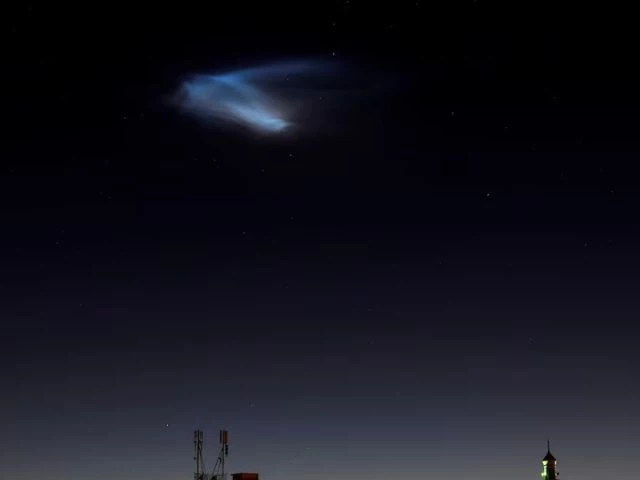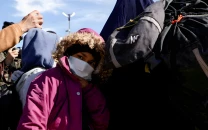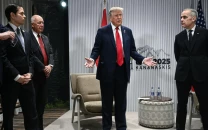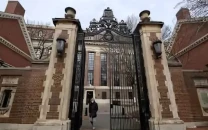Israel-Iran conflict: G7 pushes for ceasefire as Trump warns Tehran to evacuate
Meanwhile, Israel and Iran traded deadly strikes for a fifth day

The G7 issued a unified call for de-escalation in the Middle East, including a Gaza ceasefire, after President Trump backed a revised statement—then abruptly left the summit, warning Iranians to flee Tehran.
Meanwhile, Israel and Iran traded deadly strikes for a fifth day, with Tehran demanding Washington "muzzle" Netanyahu—and Europe scrambling to revive stalled nuclear talks.
Leaders of the Group of Seven (G7) nations released a joint statement calling for a resolution to the Iranian crisis and a broader de-escalation of hostilities across the Middle East, including a ceasefire in Gaza, according to CNN.
The statement was issued after US President Donald Trump agreed to sign on, following modifications to the language initially proposed by European leaders.
“We urge that the resolution of the Iranian crisis leads to a broader de-escalation of hostilities in the Middle East, including a ceasefire in Gaza,” the statement read.
Déclaration des dirigeants du #G7 sur les développements récents entre Israël et l’Iran.
— G7 (@G7) June 17, 2025
En savoir plus : https://t.co/t7sj2x10xA pic.twitter.com/mdOW3Eorwz
It was attributed to all G7 leaders — typically an indication of unanimous support — and, according to a CNN source familiar with the matter, was released with Trump’s approval after changes were made to references concerning diplomacy and international law.
Earlier in the day, officials had said Trump initially declined to endorse the draft, but shifted his stance once revisions aligned it more closely with his administration’s views.
As reported by AFP, President Trump left the G7 summit in Canada a day early, departing from the venue in the Canadian Rockies aboard a helicopter before flying back to Washington.
He cited the ongoing military exchange between Israel and Iran — now in its fifth day — as his reason for cutting the trip short.
However the US president clarified that his early departure had "nothing to do with" working on a ceasefire between Israel and Iran, refuting comments by French President Emmanuel Macron who said the US president made a ceasefire proposal.
Macron "mistakenly said that I left the G7 Summit, in Canada, to go back to DC to work on a 'cease fire' between Israel and Iran," Trump wrote on his Truth Social platform as he left the G7 summit in Canada to return to Washington.
"Wrong! He has no idea why I am now on my way to Washington, but it certainly has nothing to do with a Cease Fire. Much bigger than that," Trump added in the post.
Macron said earlier on Monday Trump had made an offer for a ceasefire between Israel and Iran. "There is indeed an offer to meet and exchange. An offer was made especially to get a ceasefire and to then kick-start broader discussions," Macron told reporters at the G7.
Meanwhile, in their final statement, the G7 leaders reiterated their support for Israel’s security and its right to self-defense, while also emphasizing the protection of civilians in the conflict. “Iran is the principal source of regional instability and terror,” the statement read. “We have been consistently clear that Iran can never have a nuclear weapon.”
AFP also reported that, shortly before leaving the summit, Trump issued a warning for residents in Tehran to evacuate the Iranian capital amid escalating tensions.
Trump calls on Iranians to evacuate Tehran
Israel and Iran attacked each other for a fifth straight day on Tuesday as US President Donald Trump urged Iranians to evacuate Tehran, citing what he claims is the country's rejection of a deal to curb nuclear weapons development, according to Reuters.
Fox News reported he would convene his National Security Council.
"Iran should have signed the 'deal' I told them to sign. What a shame, and waste of human life. Simply stated, IRAN CAN NOT HAVE A NUCLEAR WEAPON. I said it over and over again! Everyone should immediately evacuate Tehran!" Trump wrote on his Truth Social media platform.
Donald J. Trump Truth Social 06.16.25 06:30 PM EST
— Commentary Donald J. Trump Posts From Truth Social (@TrumpDailyPosts) June 16, 2025
Iran should have signed the “deal” I told them to sign. What a shame, and waste of human life. Simply stated, IRAN CAN NOT HAVE A NUCLEAR WEAPON. I said it over and over again! Everyone should immediately evacuate Tehran!
French President Emmanuel Macron said Trump's early departure from the G7 was positive, given the immediate objective was to get Israel and Iran to agree to a ceasefire that the US had proposed.
There is an offer that has been made, especially to have a ceasefire and to initiate broader discussions. And I think this is a very good thing," Macron told reporters. "So now we need to see what the stakeholders will do."
Sources told Reuters that Tehran had asked Oman, Qatar and Saudi Arabia to urge Trump to pressure Israeli Prime Minister Benjamin Netanyahu to agree to an immediate ceasefire.
"If President Trump is genuine about diplomacy and interested in stopping this war, next steps are consequential," Iranian Foreign Minister Abbas Araqchi said on X.
"Israel must halt its aggression, and absent a total cessation of military aggression against us, our responses will continue. It takes one phone call from Washington to muzzle someone like Netanyahu."
Benjamin Netanyahu is a wanted war criminal. He is also a con man who has duped successive U.S. Presidents into fighting his own wars for almost three decades.
— Seyed Abbas Araghchi (@araghchi) June 16, 2025
By all indications, the purpose of Netanyahu's criminal attack on Iran—killing hundreds of innocent civilians,… pic.twitter.com/d1p6ZmSEEg
Israel's assault on Iran
The recent conflict between Iran and Israel has escalated into the most intense direct confrontation in their history, as both countries exchange large-scale strikes.
Israel attacked Iran launching “Operation Rising Lion” on June 13, targeting Iranian military leadership, nuclear facilities, and ballistic missile production sites.
The attack resulted in the deaths of dozens which killed nearly the entire top echelon of Iran's military commanders and its leading nuclear scientists according to Reuters.
Since the Israeli attacks on Friday, the two Middle Eastern rivals have exchanged retaliatory blows. Iranian officials report over 220 deaths, mostly civilians, while Israel claims 24 of its civilians have been killed.
For years, Israel, the US, and other Western nations have exerted pressure on Iran to halt its nuclear weapons development.
Tehran, however, has consistently denied seeking nuclear weapons, asserting its right to develop nuclear technology for peaceful purposes, including enrichment, as a signatory of the Nuclear Non-Proliferation Treaty (NPT).
In contrast, Israel, which is not a signatory to the NPT, is widely believed to be the only country in the Middle East with nuclear weapons. This discrepancy remains a key point of contention in the region’s ongoing security concerns.
Critics of the West's stance on Iran often draw parallels to the Iraq War, pointing out that Saddam Hussein's alleged weapons of mass destruction (WMDs)—which were never found—were used as a pretext for military intervention.
Similarly, some argue that Iran’s nuclear programme, while unproven as a weapons threat, has been framed by the West as a justification for continued pressure and potential military action.
Meanwhile, Washington has stated that former President Donald Trump continues to pursue a nuclear deal with Iran, despite the escalating tensions.
EU Ministers urge Iran's return to 'nuclear negotiations'
European foreign ministers told their Iranian counterpart to return to nuclear negotiations with the US and refrain from escalating conflict with Israel, to which Iran's foreign minister said Tehran's priority was to defend against Israel after being assaulted, according to a French diplomatic source who informed Reuters.
France, Britain and Germany, known as the E3, are party to the 2015 nuclear accord with Iran, which aimed to curb Iran's nuclear programme in return for sanctions lifting.
Last week they put forward a resolution that was approved by the board of governors of the UN watchdog International Atomic Energy Agency which declares Iran in breach of its nuclear non-proliferation obligations despite Iran denying such claims.
"The ministers urged Iran to return to the negotiating table as quickly as possible, without preconditions," the source said, calling on Iran to avoid any headlong rush against Western interests.
Iran's Foreign Minister Abbas Araqchi was quoted by state media saying that he had recalled Iran's seriousness in diplomacy and emphasised that, "Iran has never left the negotiating table, but that (Tehran's) focus at this stage is, of course, to effectively... confront aggression."
France's Foreign Minister Jean-Noel Barrot spoke to US Secretary of State Marco Rubio ahead of the E3's call with Araqchi, the diplomatic source said.
The source said the E3 had separately passed messages to Israel urging it to not strike Iranian authorities, infrastructure or civilian populations.
The European powers, who were not part of Iran's nuclear negotiations with the United States, had grown increasingly frustrated by the US strategy in the talks. An initial written proposal from the Trump administration at the end of May was deemed very tough and offered little in return for Iran.
As part of last week's IAEA resolution, European officials had said they could refer Iran to the United Nations Security Council later in the summer to add pressure on Iran if there was no progress in the nuclear talks.
That would be separate to them reimposing UN sanctions, known as the snapback mechanism, before October 18 when the 2015 accord expires.
























COMMENTS
Comments are moderated and generally will be posted if they are on-topic and not abusive.
For more information, please see our Comments FAQ